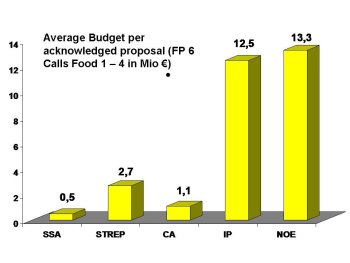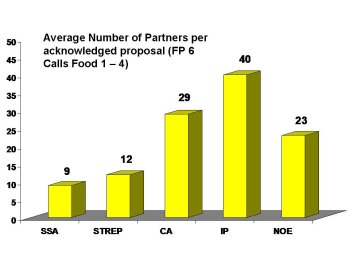Coordination Actions
Coordination Actions are a reinforced form of the Concerted Actions/Thematic Networks available under FP5.
| Ținte și Obiective: |
They aim to promote and support the networking and coordination of research and innovation activities. |
| Componentele proiectului: |
Coordination actions should cover:
of joint or common initiatives.
|
| Research spectrum: |
A single project may span over the whole research spectrum (i.e. from basic to applied research). |
| Expected funding: |
Up to several hundreds of thousands of euros |
| Type of funding: |
Grant to the budget up 100% of actual costs. |
Network of Excellence (NoE)
A Network of Excellence is an instrument for strengthening excellence by tackling the fragmentation of European research, where the main deliverable is a durable structuring and shaping of the way that research is carried out on the topic of the network.
| Ținte și Obiective: |
NoE are designed to strengthen scientific and technological excellence on a particular research topic through the durable integration of the research capacities of the participants. They aim to overcome the fragmentation of European research by:
NoE also have to spread excellence beyond the boundaries of its partnership. |
| Componentele proiectului: |
Projects must include a training component in the frame of their “spreading of excellence “ activities. |
| Numărul de participanți: |
Minimum of three partners from three different countries. However, the achievement of the “durable integration objective” usually implies a rather limited partnership. |
| Durata: |
Typically up to 5 years with a maximum of 7 years. |
| Project Management: |
An overall management framework will have to be into place. |
| Expected funding: |
> millions € but no minimum threshold |
| Type of funding: |
Funding will be in form of a grant for integration. A fixed amount which will be distributed in annual instalments. |
Specific targeted research projects
This instrument comes under the banner of the "traditional instruments". The Specific Targeted Research Projects are an evolved form of the shared-cost RTD projects and demonstration projects used in FP5.
| Ținte și Obiective: |
Specific Targeted Research Projects aim at improving:
They can take the following forms:
|
| Numărul de participanți: |
Minimum of three partners from three different Member States or Associated States, of which two must be Member States or Associated Candidate Countries. |
| Durata: |
Typically between 2 to 3 years, but may in exceptional cases be extended beyond 3 years. |
| Projects Management: |
IPs will require overall management and coordination of the consortium. |
| Type of funding: |
Funding will be the form of a grant with a ceiling for EC contribution. |
Integrated Projects (IPs)
The Integrated Project is an instrument to support objective-driven research, where the primary deliverable is new knowledge.
| Ținte și Obiective: |
Integrated projects should aim at either:
Their main tasks is to deliver knowledge for new products, processes, services, etc… |
| Componentele proiectului: |
Projects must contain:
They may also:
|
| Research spectrum: |
A single project may span over the whole research spectrum (i.e. from basic to applied research). |
| Numărul de participanți: |
Minimum of three partners from three different countries. |
| Durata: |
Typically 3 to 5 years, however there is no maximum time limit. |
| Project Management: |
IPs will require overall management and coordination of the consortium. |
| Expected funding: |
tens of millions € but no minimum threshold |
| Type of funding: |
Grant as a percentage of the total costs of the projects. |
FP6 Instruments
The different types of projects and actions to implement FP6 are also known as instruments. There are a number of different instruments for multipartner research activities, individual and host-driven mobility schemes, special types of projects for SMEs, support for utilising and developing large scale research infrastructures etc.
The Instruments have been classified into three different groups on the basis of their purpose:
- The first group comprises the instruments aimed at generating, demonstrating and validating new knowledge through research and development, and is composed of Integrated Projects (IPs) and Specific Targeted Research Projects (STREPs);
- The second group is composed only of the Networks of Excellence (NoEs), an instrument aimed at the durable integration of the participants’ activities/capacities;
- The third group comprises the instruments aimed at supporting collaboration and coordination, and other activities (such as conferences and studies) and is composed of Coordination Actions (CAs) and Specific Support Actions (SSAs).
The following two charts give an overview on the average of the budget per funded instruments according to the four calls of the thematic priority Food Safety and Quality (TP 1.1.5) and on the average of the number of partners per instrument.





